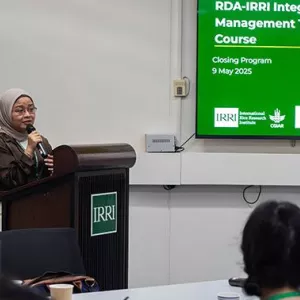RDA-IRRI champions climate-smart pest management for sustainable rice production
LAGUNA, Philippines (13 May 2025) — IRRI emphasizes prevention and suppression at the recent International Technology Cooperation Center of the Rural Development Administration – Korea (ITCC- RDA) and IRRI training on Integrated Pest Management (IPM). The 5-day training course aimed to introduce recent paradigm shifts in rice pest management, update participants on recent advances in management technologies, and assist them

RDA-IRRI champions climate-smart pest management for sustainable rice production
LAGUNA, Philippines (13 May 2025) — IRRI emphasizes prevention and suppression at the recent International Technology Cooperation Center of the Rural Development Administration – Korea (ITCC- RDA) and IRRI training on Integrated Pest Management (IPM). The 5-day training course aimed to introduce recent paradigm shifts in rice pest management, update participants on recent advances in management technologies, and assist them in the preparation and implementation of their localized IPM research plans.
Integrated Pest Management (IPM) is a sustainable and effective management approach to controlling pests in agriculture by implementing a combination of scientific techniques and ecological knowledge such as pest biology and behavior. IPM was first introduced in the 1970’s to address the growing negative effects of pesticides in agriculture. “Rice will have to be produced, processed, and marketed in a more sustainable way.”, IRRI Scientist and Country Representative for Cambodia Dr. Nurmi Pangesti said as she explained how climate change is shaping ecosystems involved in global rice production.

